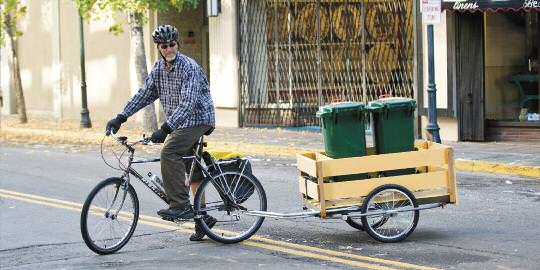edible notables
PEDALING FOR PRODUCE
Reno Rot Riders collects strives to save the soil.
WRITTEN BY ERIN MEYERING
PHOTO BY CANDICE NYANDO
At your favorite restaurant, you order a cherished dish and submerge your fork into it, enjoying the succulent flavors of various vegetables. Usually, many parts of those vegetables are tossed into the garbage. Now, the unused carrot tops, discarded tomato piths, and eggshells may find new life enriching our city’s soil.
For several local restaurants, leftover compostable scraps (or rot) from the chefs’ creations go to Rot Riders, a bike-powered compost collection service.
Wheels against waste
Starting in October 2015, Reno Rot Riders collected about three tons of organic, compostable material in its first three months of operation, and from only a handful of local restaurants, including Campo and Great Full Gardens. Now, the program manager seeks to expand the effort’s imprint and significantly transform how locals handle their compostable waste.
Kyle Chandler-Isacksen, Reno Rot Riders founder, lives small with his two children and wife, Katy. And we do mean small. The entire family lives on only $7,000 each year, without electricity, so that their daily actions align with their morals. (Read more about in our story, Be the Change, by Barbara Twitchell.) Kyle and his family constantly strive to preserve resources, help the environment, address climate change, and reduce their carbon footprints. As part of that message, Kyle and Katy created Reno Rot Riders to give to the community a means for eco-conscious living.
Multi-pronged remedy
Creating compost helps filter nutrients back into the soil system, which helps retain water and aids in drought prevention. It helps support local farmers and their agricultural practices, which ultimately results in more wholesome food for the community. Lastly, composting lengthens the life of a landfill by reducing the amount of trash dumped there.
Kyle collects waste on a bicycle connected to a trailer carrying garbage bins. The contraption isn’t just a clever marketing tool. It furthers his sustainable and green business model. He takes the waste to Paradise Park Community Gardens, which is part of Kyle’s Be the Change project (an urban homestead devoted to family learning and service), and other area gardens, where it gets used. The program recently expanded to residential customers, too.
“We’ve figured out the nuts and bolts of [the program],” says Chandler-Isacksen. “[Now] we’re ready to grow.”
Erin Meyering is the associate editor of edible Reno-Tahoe. She is mesmerized by the staggering amount of organic matter that was collected in just the first three months of this project.
Resources
For details about Reno Rot Riders or to make a donation, visit http://www.Renorotriders.org.


